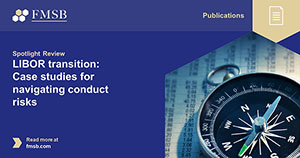As the risks associated with the continued provision of new LIBOR-linked products increase, the FMSB's ‘LIBOR transition: Case studies for navigating conduct risks’
highlights issues for market participants to address when offering new products to clients or changing performance benchmarks.
While the LIBOR transition presents market participants with unique challenges, many of the conduct-related risks, and the means of managing them, are not novel. The paper therefore builds on existing FMSB principles and relevant regulatory expectations,
combining the broad expertise of FMSB’s IBOR Transition Working Group participants, and explores ways in which firms can manage the uncertainties and associated risks of the transition through the lens of non-prescriptive good practice observations.
The paper includes four practical case studies which cover cash and derivative products and performance benchmarks. The case studies are relevant across the sell-side, buy-side and corporates.
This paper has been developed by FMSB’s IBOR Transition Working Group which has representation from a wide range of FMSB member firms.
The paper includes four practical case studies which cover cash and derivative products and performance benchmarks
FMSB intends to add to this Spotlight Review during the transition process to include additional case studies focusing on areas of uncertainty that are of particular concern to market participants.
Martin Pluves, CEO of FMSB, said: “Managing the challenges of LIBOR discontinuation and the transition to risk-free rates is a major undertaking for financial market participants the world over. FMSB’s role is to support its broad membership
in identifying and managing conduct risks arising from the transition and improving the fairness and effectiveness of global markets. I am delighted to announce the publication of this very practical Spotlight Review, which illuminates challenges
from market practitioners’ perspectives and explores approaches for navigating various risks posed by the transition to risk-free rates.”
Chris Salmon, FMSB chair of the IBOR Transition Working Group, and chief control officer for global markets at HSBC, explained: “With the deadline fast approaching for the discontinuation of the LIBOR interest rate benchmark, FMSB’s practical
guidance and case studies will be, now more than ever, relevant to corporates, insurers, asset managers and banks, who are currently managing their transition to alternative risk-free reference rates.”

Tushar Morzaria, chair of the Sterling Risk-Free Reference Rates Working Group (RFRWG), said: “This Review by the FMSB is a very welcome extension of the work undertaken by the Sterling Risk-Free Reference Rates Working Group. The
transition away from LIBOR to more reliable and robust rates has long been a regulatory and market imperative and the FMSB work will fill an important role alongside the technical work already completed by the RFRWG and other bodies internationally.”